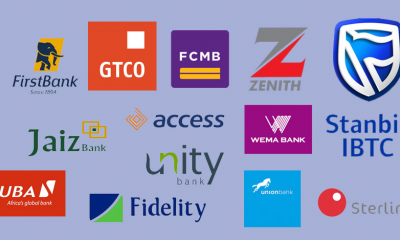Economy
Drop in Nigerian Treasury Bills Yield Imminent

By FSDH Research
Yields on the Nigerian Treasury Bills (NTBs), particularly on the 364-day tenor, are likely to drop with the plan of the Debt Management Office (DMO) to refinance the NTBs through foreign debt.
The DMO hinted recently that the Federal Government of Nigeria (FGN) plans to issue about US$3bn in foreign debt of longer tenor, to refinance the domestic debt particularly the high-cost NTBs.
The plan is in line with the debt management strategy of the FGN for 2016-2019, with the overall objective of reducing its total cost of borrowing to achieve the country’s strategic target of an optimal debt mix of 60 percent and 40 percent for domestic and external debts respectively.
The debt management strategy also sets a target of domestic debt mix of 75 percent and 25 percent for long and short-tenored debts respectively.
Our analysis of the data from the DMO on the debt structure of Nigeria as at March 2017 shows that the total public debt stood at N19.16 trillion, made up of N14.93 trillion (78 percent) and N4.23 trillion (22 percent) in domestic and foreign debts respectively.
Although the external debt component at 22 percent as at March 2017 is far from the optimal mix of 40 percent, it is an improvement from 14 percent as at 2013.
If the DMO were to move the debt position as at March 2017 to the planned optimal level, it means that it would have to refinance about N3.43 trillion of the local debt in favour of the external debt.
Thus, we expect the external borrowing to grow faster than the domestic borrowing in the medium to long term.
The FGN’s component of the domestic debt stood at N11.97 trillion as at March 2017. NTB, which is the short-term debt, accounted for 30 percent or N3.60 trillion of the domestic debt of the FGN. This is higher than the target of 25 percent under the debt management strategy, meaning that the FGN could be issuing more of FGN Bonds than NTBs going forward.
This strategy will achieve two things: reduce the weighted average cost of borrowing for the government because the interest rate on the 364-Day NTB is higher than the interest rate on the FGN Bonds; and extend the tenor of the FGN debts.
Many corporate and individual borrowers have criticized the crowding out effect of the NTBs due to their high yields. The average yield on the 364-Day NTB in 2016 stood at 16.15 percent while the average yield between January 2017 and August 2017 stood at 22.91 percent.
From the monetary policy perspective, the high yields may be necessary to tame high inflation and protect the value of the local currency – it however constitutes a drain on the inadequate revenue of the FGN.
The International Monetary Fund (IMF) noted earlier in August 2017 that preliminary data for the first half of 2017 indicates significant revenue shortfalls, with the interest-payments to revenue ratio remaining high, at 40 percent as at the end of June 2017, and projected to increase further under current policies.
The DMO in its 2016 Debt Sustainability Analysis (DSA) report notes that the debt service-to-revenue ratio (for FGN only) breached the country’s specific threshold of 28 percent. The DSA report added that the FGN debt portfolio still remains highly vulnerable to persistent shocks in revenue, indicating a potential challenge in maintaining debt sustainability.
The total amount of debt service in 2016 stood at N1.20trn and represents 58 percent of the federal allocation disbursed to the FGN.
As at March 2017 the total debt service stood at N449 billion representing 82 percent of the total FGN allocation of N549 billion for the period.
We note that FGN revenue has been challenged in the last two years on account of a drop in oil revenue.
Thus, the plan of the FGN is to use the refinancing to lower debt service figures taking advantage of the relatively lower interest rate in the international financial markets. The FGN will have to put in place strategies to manage the currency risks associated with foreign borrowing.
The average yield on the FGN 6.375 percent July 2023 Eurobond from January till August 21, 2017 is 5.94 percent compared with 364-Day NTB of 22.91 percent.
The various efforts of the government should also increase revenue accruable to the country and the FGN.
Economy
NASD Exchange Rises 1.22% on Sustained Bargain-Hunting

By Adedapo Adesanya
Strong appetite for unlisted stocks further raised the NASD Over-the-Counter (OTC) Securities Exchange by 1.22 per cent on Friday, February 27.
Data revealed that the NASD Unlisted Security Index (NSI) was up by 49.41 points to 4,083.87 points from 4,034.46 points, and lifted the market capitalisation by N19.56 billion to N2.433 trillion from N2.413 trillion.
The volume of securities bought and sold by investors increased by 243.0 per cent to 4.5 million units from 1.3 million units, and the number of deals grew by 15.8 per cent to 44 deals from 38 deals, while the value of securities went down by 19.7 per cent to N82.5 million from N102.8 million.
Central Securities Clearing System (CSCS) Plc ended the session as the most active stock by value on a year-to-date basis with 35.0 million units valued at N2.1 billion, followed by Okitipupa Plc with 6.3 million units worth N1.1 billion, and Geo-Fluids Plc with 122.8 million units transacted for N480.4 million.
Resourcery Plc ended the day as the most traded stock by volume on a year-to-date basis with 1.05 billion units sold for N408.7 million, followed by Geo-Fluids Plc with 122.8 million units valued at N480.4 million, and CSCS Plc with 35.0 million units traded for N2.1 billion.
There were six price gainers yesterday led by FrieslandCampina Wamco Nigeria Plc, which added N9.02 to close at N111.46 per unui compared with the previous day’s N102.44 per unit, Nipco Plc appreciated by N6.00 to N284.00 per share from N278.00 per share, CSCS Plc recouped N1.87 to sell at N70.12 per unit versus Thursday’s value of N68.25 per unit, Geo-Fluids Plc improved by 17 Kobo to close at N3.18 per share versus N3.01 per share, Industrial and General Insurance (IGI) Plc advanced by 5 Kobo to sell at N50 Kobo per unit versus the preceding day’s 45 Kobo per unit, and Acorn Petroleum Plc chalked up 2 Kobo to settle at N1.34 per share, in contrast to the previous day’s N1.32 per share.
Economy
FX Liquidity Crunch Sinks Naira to N1,363/$1 at NAFEX, N1,370/$1 at Black Market

By Adedapo Adesanya
The Naira performed poorly against the United States Dollar in the different segments of the foreign exchange (FX) market on February 27, closing the week without a gain.
In the black market, the domestic currency weakened against the Dollar yesterday by N5 to close at N1,370/$1 compared with Thursday’s closing price of N1,365/$1, and at the GT Bank forex desk, it lost N2 to sell N1,369/$1 versus the N1,367/$1 it was sold a day earlier.
Yesterday, the Nigerian Naira lost N3.75 or 0.26 per cent against the greenback at the Nigerian Autonomous Foreign Exchange Market (NAFEX) to trade at N1,363.39/$1 compared with the previous day’s N1,359.82/$1.
Also, the Naira depreciated against the Euro at the official market during the session by N2.33 to quote at N1,609.22/€1 versus N1,606.89/€1, and appreciated against the Pound Sterling by N6.74 to settle at N1,836.49/£1 compared with the preceding session’s N1,843.23/£1.
The Naira’s latest depreciation occurred as FX demand continued to outpace available supply, intensifying pressure in the market.
In response to the negative momentum, the Central Bank of Nigeria (CBN) intervened by selling Dollars to banks and other authorised dealers in an effort to stabilise the local currency. The move came barely a week after the apex bank had purchased about $190 million from the foreign exchange market to temper the Naira’s rally.
Specifically, the CBN injected $200 million into the official market between Tuesday and Wednesday through an intervention call. However, the liquidity support proved insufficient to reverse the currency’s downward trend.
Meanwhile, the cryptocurrency market declined on Friday, with Solana (SOL) down by 10.4 per cent to $78.60, as Dogecoin (DOGE) decreased by 9.5 per cent to $0.0982.
Further, Cardano (ADA) slumped 8.9 per cent to $0.2647, Ethereum (ETH) slipped by 8.6 per cent to $1,859.10, Ripple (XRP) shrank by 8.2 per cent to $1.30, Litecoin (LTC) lost 1.4 per cent to close at $52.39, Bitcoin (BTC) slid 5.9 per cent to $63,686.39, and Binance Coin (BNB) went down by 4.9 per cent to $596.64, while the US Dollar Tether (USDT) and the US Dollar Coin (USDC) traded flat at $1.00 apiece.
Economy
Oil Prices Climb on Geopolitical Anxiety

By Adedapo Adesanya
Oil prices rose about 2 per cent on Friday, with traders bracing for supply disruptions as nuclear talks between the United States and Iran were without an agreement.
Brent crude futures settled at $72.48 a barrel after chalking up $1.73 or 2.45 per cent, while US West Texas Intermediate crude futures finished at $67.02 a barrel, up $1.81 or 2.78 per cent.
The two sides agreed to extend indirect negotiations into next week, but traders grew sceptical that an agreement between US President Donald Trump’s administration and Iran was possible.
The US and Iran held indirect talks in Geneva on Thursday after Mr Trump ordered a military buildup in the region.
Oil prices gained during the talks, on media reports indicating that discussions had stalled over U.S. insistence on zero enrichment of uranium by Iran. However, prices eased after the mediator from Oman said the two sides had made progress.
They plan to resume negotiations with technical-level discussions scheduled next week in Vienna, Omani Foreign Minister Sayyid Badr Albusaidi said on X.
Market analysts noted that geopolitical risk premiums of $8 to $10 a barrel have been built into oil prices on fears that a conflict will disrupt Middle East supply through the Strait of Hormuz, where about 20 per cent of global oil supply passes.
To cushion the impact from a possible strike, one of the world’s largest oil producers, the United Arab Emirates (UAE), is set to export more of its flagship Murban crude in April, while Saudi Arabia said it would also increase oil production.
Additionally, Saudi Arabia may raise its April crude price to Asia for the first time in five months due to higher demand from India to replace Russian supplies, potentially raising it by about $1 a barrel.
Meanwhile, the Organisation of the Petroleum Exporting Countries and its allies (OPEC+) is likely to consider raising oil output by 137,000 barrels per day for April at its March 1 meeting, after suspending production increases in the first quarter.
The resumption of output increases after a three-month pause would allow Saudi Arabia and the UAE to regain market share at a time when other OPEC+ members, such as Russia and Iran, contend with Western sanctions while Kazakhstan recovers from a series of oil production setbacks.
Eight OPEC+ producers – Saudi Arabia, Russia, the United Arab Emirates, Kazakhstan, Kuwait, Iraq, Algeria and Oman will meet at the meeting on Sunday.
-

 Feature/OPED6 years ago
Feature/OPED6 years agoDavos was Different this year
-
Travel/Tourism10 years ago
Lagos Seals Western Lodge Hotel In Ikorodu
-

 Showbiz3 years ago
Showbiz3 years agoEstranged Lover Releases Videos of Empress Njamah Bathing
-

 Banking8 years ago
Banking8 years agoSort Codes of GTBank Branches in Nigeria
-

 Economy3 years ago
Economy3 years agoSubsidy Removal: CNG at N130 Per Litre Cheaper Than Petrol—IPMAN
-

 Banking3 years ago
Banking3 years agoSort Codes of UBA Branches in Nigeria
-

 Banking3 years ago
Banking3 years agoFirst Bank Announces Planned Downtime
-

 Sports3 years ago
Sports3 years agoHighest Paid Nigerian Footballer – How Much Do Nigerian Footballers Earn

















